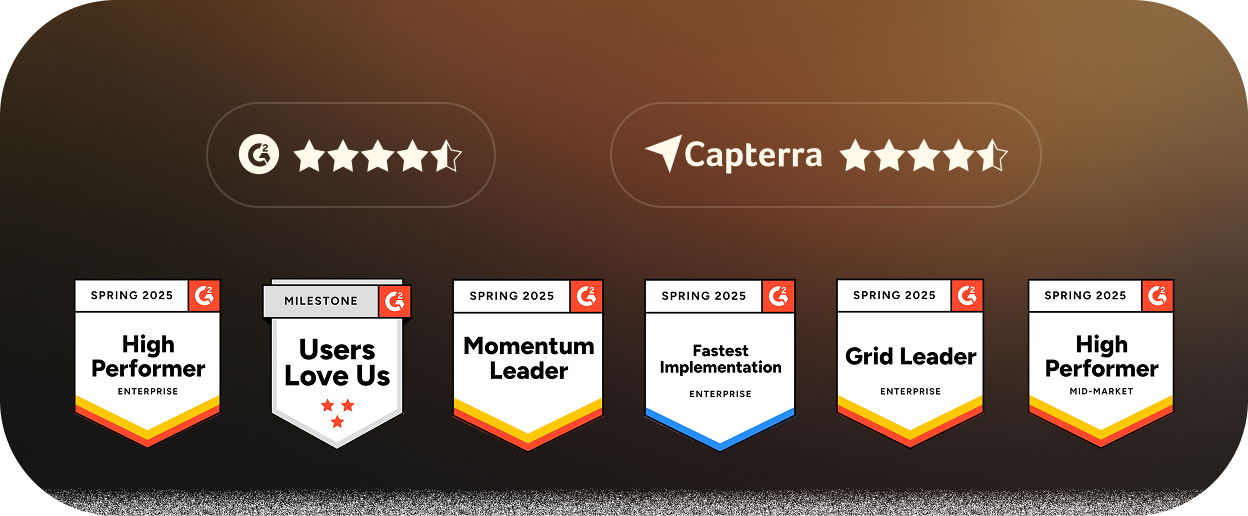
مسرد المصطلحات
بلام - منصة المكافآت والحوافز والمدفوعات
برامج مكافآت الإحالة
برامج مكافآت الإحالة هي مبادرات استراتيجية تنفذها الشركات لتشجيع العملاء الحاليين على إحالة عملاء جدد إلى منتجاتها أو خدماتها. تستفيد هذه البرامج من قوة التسويق الشفهي، حيث تستفيد من شبكات العملاء الراضين لتوسيع قاعدة العملاء.
ما هي مكافآت الإحالة؟
مكافآت الإحالة هي حوافز تقدمها الشركات للأفراد الذين يحيلون عملاء أو مستخدمين جدد إلى الشركة. تهدف هذه البرامج إلى الاستفادة من شبكات العملاء الحاليين لجلب أعمال جديدة من خلال التوصيات الشفهية.
كيف تعمل برامج مكافآت الإحالة؟
برامج مكافآت الإحالة هي أدوات استراتيجية تستفيد من رضا العملاء لجلب أعمال جديدة. وإليك كيفية عملها عادةً:
- تحديد المُحيلين: يتم تشجيع العملاء السعداء على إحالة الآخرين عبر الكلام الشفهي أو وسائل التواصل الاجتماعي أو منصات الإحالة.
- تتبع الإحالات: تتعقب الروابط الفريدة أو الرموز أو الصفحات المقصودة الإحالات وتسجل المصدر الأصلي عند تحويل العميل المحتمل.
- اكتساب عملاء جدد: من المرجح أن تتحول العملاء المحتملون المحالون إلى عملاء فعليين بفضل التوصيات الموثوقة، مما يؤدي إلى توسيع قاعدة العملاء.
- توزيع المكافآت: يحصل المُحيلون على مكافآت محددة مسبقًا مثل الخصومات أو النقود أو المنتجات المجانية أو بطاقات الهدايا بمجرد نجاح الإحالة.
- التواصل والشفافية: تساعد التحديثات والتفسيرات الواضحة في إبقاء المشاركين على اطلاع دائم ومشاركة فعالة وثقة في البرنامج.
- الترويج والتسويق: تقوم الشركات بالترويج للبرنامج عبر البريد الإلكتروني أو وسائل التواصل الاجتماعي أو الرسائل داخل التطبيق لزيادة الظهور والمشاركة.
ما هي فوائد تقديم مكافآت الإحالة؟
تقدم مكافآت الإحالة مزايا متعددة للشركات التي تسعى إلى التوسع بكفاءة. وتشمل المزايا الرئيسية ما يلي:
- نمو قاعدة العملاء: تساعد في توسيع نطاق الوصول من خلال التوصيات الشخصية من المستخدمين الحاليين.
- تكاليف اكتساب أقل: غالبًا ما تكون مكافآت الإحالة أكثر فعالية من حيث التكلفة مقارنة بالإعلانات المدفوعة.
- ولاء أقوى للعلامة التجارية: مكافأة الإحالات يبني حسن النية ويقوي العلاقات مع العملاء.
- معدلات تحويل أعلى: العملاء المحالون أكثر عرضة للتحويل بسبب التوصيات الموثوقة.
- المشاركة المستمرة: يحافظون على مشاركة العملاء الحاليين واستثمارهم في العلامة التجارية.
- ثقة معززة:تحظى التوصياتمن الأصدقاء أو العائلة بثقة أكبر، مما يزيد من احتمالية التحويل.
- التسويق الشفهي:تستفيد برامج الإحالةمن قوة التسويق الشفهي، الذي غالبًا ما يكون أكثر تأثيرًا من الإعلانات التقليدية.
- نتائج قابلة للقياس:تتيح برامج الإحالةللشركات تتبع وقياس نجاح جهودها في اكتساب العملاء.
ما هي أنواع المكافآت التي يتم تقديمها عادة في برامج الإحالة؟
تشمل المكافآت التي يتم تقديمها عادة في برامج الإحالة ما يلي:
- الخصومات:قد يحصل المُحيلونوالعملاء الجدد على خصومات على المنتجات أو الخدمات.
- الحوافز النقدية:يمكن للمُحيلينالحصول على مكافآت نقدية أو أرصدة مقابل الإحالات الناجحة.
- المنتجات أو الخدمات المجانية:قد يحصل المُحيلونعلى منتجات أو خدمات مجانية كمكافأة.
- وصول حصري:قد يحصل المُحيلونعلى وصول حصري إلى الميزات الجديدة أو الأحداث أو العروض الترويجية.
- بطاقات الهدايا:قد يحصل المُحيلونعلى بطاقات هدايا من متاجر التجزئة الشهيرة كمكافآت.
ما هو الدور الذي تلعبه التكنولوجيا في إدارة برامج مكافآت الإحالة؟
تلعب التكنولوجيا دورًا حاسمًا في إدارة برامج مكافآت الإحالة من خلال توفير:
- التتبع الآلي:تعمل التكنولوجياعلى أتمتة تتبع الإحالات، مما يضمن الدقة والكفاءة في توزيع المكافآت.
- تحليل البيانات:تقوم أدوات التحليل المتقدمةبتحليل بيانات برنامج الإحالة، وتقدم رؤى حول الأداء وسلوك المشاركين والمجالات التي تحتاج إلى تحسين.
- منصاتالاتصال:تيسرالتكنولوجياالتواصل مع المشاركين عبر قنوات مختلفة، مما يضمن تحديث المعلومات والمشاركة في الوقت المناسب.
- واجهاتسهلة الاستخدام:تتيح الواجهات سهلة الاستخدامللمشاركين تتبع إحالاتهم والمطالبة بمكافآتهم وفهم تفاصيل البرنامج بسهولة.
- التكامل مع الأنظمة:يضمن التكاملمع أنظمة الأعمال الأخرى، مثل أنظمة إدارة علاقات العملاء ومنصات التسويق، التعاون السلس وتدفق البيانات.
كيف يمكن للشركات الترويج لبرامج الإحالة الخاصة بها وتسويقها؟
لتعزيز وتسويق برامج الإحالة بشكل فعال، يمكن للشركات القيام بما يلي:
- التواصل الواضح:تواصل بوضوححول مزايا وتفاصيل برنامج الإحالة عبر قنوات مختلفة، بما في ذلك البريد الإلكتروني ووسائل التواصل الاجتماعي وموقع الشركة على الإنترنت.
- تحفيز الطرفين: قدمحوافز جذابة لكل من المُحيل والعميل الجديد، مما يخلق موقفًا مربحًا للطرفين.
- استفد من وسائل التواصل الاجتماعي: استخدممنصات التواصل الاجتماعي لزيادة الوعي وتشجيع المشاركة بين العملاء الحاليين.
- إنشاء محتوى جذاب: قم بتطويرمحتوى جذاب، مثل مقاطع الفيديو أو الرسوم البيانية أو قصص النجاح، لإبراز قيمة المشاركة.
- حملات البريد الإلكتروني: قم بتنفيذحملات بريد إلكتروني موجهة للوصول إلى العملاء الحاليين وتشجيعهم على المشاركة في برنامج الإحالة.
هل هناك أفضل الممارسات لتصميم برامج مكافآت الإحالة الناجحة؟
يتطلب تصميم برامج مكافآت الإحالة الناجحة اتباع أفضل الممارسات التالية:
- قواعد واضحة وبسيطة:حدد بوضوحقواعد ومتطلبات المشاركة لتجنب الالتباس وتشجيع المشاركة.
- حوافز جذابة: قدمحوافز جذابة وقيّمة لكل من المُحيل والعميل الجديد.
- تعزيز الشفافية: كنشفافًا بشأن كيفية عمل البرنامج، بما في ذلك التتبع وتوزيع المكافآت ومعايير الأهلية.
- إمكانية الوصول عبر الأجهزة المحمولة: تأكد منأن برنامج الإحالة متاح وسهل الاستخدام على الأجهزة المحمولة من أجل مشاركة أوسع.
- التواصل المنتظم: إبقاءالمشاركين على اطلاع من خلال التحديثات المنتظمة والتذكيرات والتقدير لمساهماتهم.
هل مكافآت الإحالة خاضعة للضريبة؟
نعم، تعتبر مكافآت الإحالة خاضعة للضريبة بشكل عام إذا اعتبرتها السلطات الضريبية دخلاً. فيما يلي النقاط الرئيسية:
- المكافآت النقدية: تخضع للضريبة في معظم الأحيان وقد تتطلب الإبلاغ الضريبي من قبل الشركة (على سبيل المثال، نموذج 1099-NEC في الولايات المتحدة إذا تجاوزت قيمتها 600 دولار سنويًا).
- بطاقات الهدايا والسلع: غالبًا ما تعامل على أنها مزايا خاضعة للضريبة، حتى لو كانت قيمتها ضئيلة.
- أرصدة الحساب أو الخصومات: قد لا تخضع للضريبة إذا اعتبرت ترويجية وغير قابلة للاستبدال نقدًا، ولكن هذا يختلف حسب الولاية القضائية.
ملاحظة: تختلف القواعد الضريبية من بلد إلى آخر، ويجب على الشركات أن توضح بوضوح الآثار الضريبية في شروط برامج الإحالة الخاصة بها. قد يتحمل المستفيدون أيضًا مسؤولية الإبلاغ عن المكافآت في إقراراتهم الضريبية.
















